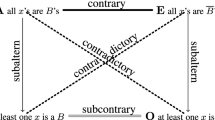Abstract
Following Zimmermann (2000), I propose that disjunctions are to be treated as conjunctions of modal propositions, and that the essential contribution of ‘or’ is merely to present a list of alternatives. Any further ingredients in the interpretation of a disjunctive sentence (such as exhaustivity) are due to extraneous factors; they are not part of the meaning of ‘or’. My analysis differs from Zimmermann’s in that it is more general and renders the logical form of disjunctive sentences less complex, but the main innovation is that the context dependence of modality is called upon to play a leading role. The theory applies not only to disjunctions of ‘may’-sentences but also covers universal modalities and conditional disjuncts. The paper concludes with a discussion of narrow-scope ‘or’.
Similar content being viewed by others
References
P. Barrouillet J.-F. Lecas (2000) ArticleTitle‘Illusory Inferences from a Disjunction of Conditionals: A New Mental Models Account’ Cognition 76 167–173 Occurrence Handle10.1016/S0010-0277(00)00075-5
D. Edgington (1995) ArticleTitle‘On Conditionals’ Mind 104 235–329
Frank, A.: 1997, Context Dependence in Modal Constructions, Doctoral dissertation, University of Stuttgart.
G. Gazdar (1979) Pragmatics: Implicature, Presupposition, and Logical Form Academic Press New York
B. Geurts (1999) Presuppositions and Pronouns Elsevier Oxford
Geurts, B.: 2004, ‘On an Ambiguity in Quantified Conditionals’, ms, University of Nijmegen.
Geurts, B.: (to appear), ‘Existential Import’, in I. Comorovski and K. von Heusinger (eds.), Existence: Syntax and Semantics. Kluwer, Dordrecht.
Groenendijk, J. and M. Stokhof: 1984, Studies on the Semantics of Questions and the Pragmatics to Answers, Doctoral dissertation, University of Amsterdam.
P. Johnson-Laird F. Savary (1996) ArticleTitle‘Illusory Inferences about Probabilities’ Acta Psychologica 93 69–90 Occurrence Handle10.1016/0001-6918(96)00022-4
P. Johnson-Laird F. Savary (1999) ArticleTitle‘Illusory Inferences: A Novel Class of Erroneous Deductions’ Cognition 71 191–229 Occurrence Handle10.1016/S0010-0277(99)00015-3
H. Kamp (1979) ‘Semantics versus Pragmatics’ F. Guenthner S. Schmidt (Eds) Formal Semantics and Pragmatics of Natural Language Reidel Dordrecht 255–287
A. Kratzer (1979) ‘Conditional Necessity and Possibility’ R. Bäuerle U. Egli A. Stechow Particlevon (Eds) Semantics from Different Points of View Springer-Verlag Berlin 117–147
A. Kratzer (1999a) ‘Conditionals’ A. Stechow Particlevon D. Wunderlich (Eds) Semantics: An International Handbook of Contemporary Research De Gruyter Berlin 651–656
A. Kratzer (1999) ‘Modality’ A. Stechow Particlevon D. Wunderlich (Eds) Semantics: An International Handbook of Contemporary Research De Gruyter Berlin 639–650
D. K. Lewis (1975) ‘Adverbs of Quantification’ E.L. Keenan (Eds) Formal Semantics of Natural Language Cambridge University Press Cambridge 3–15
S. Paris (1973) ArticleTitle‘Comprehension of Language Connectives and Propositional Logical Relationships’ Journal of Experimental Child Psychology 16 278–291 Occurrence Handle10.1016/0022-0965(73)90167-7
Schulz, K.: 2003, You May Read It Now or Later: A Case Study on the Paradox of Free Choice Permission, Master thesis, University of Amsterdam.
Simons, M.: 1998, Issues in the Semantics and Pragmatics of Disjunction, PhD thesis, Cornell University.
Simons, M. (to appear), ‘Dividing Things Up: The Semantics of Or and Model/Or Interaction’, Natural Language Semantics.
A. Szabolcsi B. Haddican (2004) ArticleTitle‘Conjunction Meets Negation: A Study in Crosslinguistic Variation’ Journal of Semantics 21 219–249 Occurrence Handle10.1093/jos/21.3.219
R. Rooy Particlevan K. Schulz (2004) ArticleTitle‘Exhaustive Interpretation of Complex Sentences’ Journal of Logic, Language and Information 13 491–519
M. Woods (1997) Conditionals Clarendon Press Oxford
T. E. Zimmermann (2000) ArticleTitle‘Free Choice Disjunction and Epistemic Possibility’ Natural Language Semantics 8 255–290 Occurrence Handle10.1023/A:1011255819284
Z. Zvolenszky (2002) ‘Is a Possible Worlds Semantics of Modality Possible? A Problem for Kratzer’s Semantics’ B. Jackson (Eds) Proceedings of SALT 12 CLC Publications Ithaca N.Y. 339–358
Author information
Authors and Affiliations
Corresponding author
Additional information
I am indebted to Fabian Battaglini, Mandy Simons, Anna Szabolcsi, and Ede Zimmermann, who provided me with helpful comments on the first version of this paper, and to Phil Johnson-Laird and Keith Stenning, who commented on the paper’s grandmother (now deceased).
Rights and permissions
About this article
Cite this article
Geurts, B. Entertaining Alternatives: Disjunctions as Modals. Nat Lang Seman 13, 383–410 (2005). https://doi.org/10.1007/s11050-005-2052-4
Issue Date:
DOI: https://doi.org/10.1007/s11050-005-2052-4




